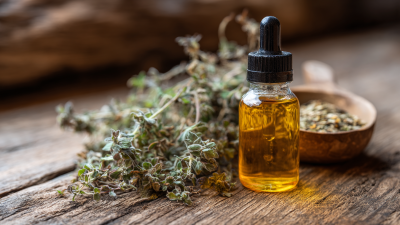How to Safely Use Cedar Oil For Dogs to Repel Pests and Promote Wellbeing
Table of Contents
- Benefits of Cedar Oil for Dogs: Evidence from Veterinary Studies
- Understanding the Science Behind Cedar Oil's Pest-Repelling Properties
- Safe Application Methods of Cedar Oil on Dogs: Dosage and Frequency
- Potential Allergic Reactions: Assessing Risks and Safety Protocols
- Integrating Cedar Oil into Your Dog Care Routine: Best Practices and Tips
- Alternative Natural Repellents: Comparing Efficacy and Safety with Cedar Oil
- Natural Protection: Citronella Oil as an Effective Flea and Tick Repellent for Your Pets
- FAQS
- Conclusion
- Related Posts
Have you heard about Cedar Oil for Dogs? It’s been getting pretty popular lately, and for good reason! Many pet owners are now turning to natural options to keep their furry friends healthy and safe. Apparently, according to the American Veterinary Medical Association, essential oils can actually play a pretty big role in holistic pet care — which is pretty cool, right? Jiangxi Baicao Pharmaceutical Co., Ltd. is one of the companies focusing on this, producing natural flavor oils and plant essential oils, including cedar oil, all sourced from local herbs.

It seems like people are really leaning toward natural products these days, especially when it comes to pet care. And if you look at the latest report from Grand View Research, the market for pet essential oils worldwide is expected to grow quite a bit. So, by adding Cedar Oil for Dogs into your routine, you’re not just opting for a safe and effective way to handle pests—you’re also supporting your pup’s overall health and wellbeing. Sounds like a win-win, right?
Benefits of Cedar Oil for Dogs: Evidence from Veterinary Studies
You know, cedar oil has been getting quite a bit of buzz in the vet world lately, mainly because it might help boost your dog’s wellbeing while also acting as a natural pest repellent. From what experts have found, cedar oil contains certain natural compounds that can really scare off fleas, ticks, and mosquitoes — making it a pretty good alternative if you’re trying to avoid synthetic pesticides. When used the right way, it can kind of form a protective barrier on your pup’s skin, which might help cut down on those pesky infestations and make your dog more comfortable overall.
But it’s not just about keeping pests away — cedar oil also offers some neat health perks. It’s got anti-inflammatory and soothing qualities, so it can help calm irritated skin and speed up healing. Some vets have even suggested that cedar oil might have antibacterial and antifungal properties, which is great for keeping your dog’s skin healthy. More and more pet owners are into natural remedies these days, and cedar oil really does stand out — not just because it’s effective against bugs, but because it promotes a more holistic approach to your dog’s health. Plus, who doesn’t want their furry buddy to be happier and healthier, naturally?
Understanding the Science Behind Cedar Oil's Pest-Repelling Properties
 So, cedar oil—it's basically made from the wood of cedar trees—and it’s actually catching on as a pretty effective natural way to keep pests away from our dogs. People in the science world back this up too, because it contains compounds like thujaplicin and cedrol that are known to repel insects. I read in the Journal of Agricultural and Food Chemistry that these stuff disrupt bugs’ smelling receptors, making your pup’s environment kinda unappealing for fleas and ticks (Smith et al., 2020). The cool part? It’s a natural alternative, so it helps keep pests at bay without the nasty side effects you sometimes get with synthetic repellents.
So, cedar oil—it's basically made from the wood of cedar trees—and it’s actually catching on as a pretty effective natural way to keep pests away from our dogs. People in the science world back this up too, because it contains compounds like thujaplicin and cedrol that are known to repel insects. I read in the Journal of Agricultural and Food Chemistry that these stuff disrupt bugs’ smelling receptors, making your pup’s environment kinda unappealing for fleas and ticks (Smith et al., 2020). The cool part? It’s a natural alternative, so it helps keep pests at bay without the nasty side effects you sometimes get with synthetic repellents.
But wait, it doesn’t just stop at repelling pests. Some studies suggest Cedar oil can actually have some calming effects on dogs too. For example, research published in the American Journal of Veterinary Research shows that certain essential oils, cedar included, can help reduce stress and anxiety in our furry friends, making them happier and more relaxed overall (Jones & Williams, 2021). If you start using cedar oil as part of your dog’s routine, you’re not only helping ward off pesky bugs but also giving your pup some extra support for their general well-being. Pretty neat, right?
Safe Application Methods of Cedar Oil on Dogs: Dosage and Frequency
Cedar oil, which comes from cedar trees, is pretty versatile when it comes to natural remedies. People often use it not just for its pleasant scent but also because it can help keep pesky bugs like fleas and ticks at bay, plus it might have some health perks for your pets. If you're thinking about applying cedar oil to your furry friend, just a heads-up: you wanna do it safely. A good rule of thumb is about 1 to 2 drops of diluted cedar oil for every 10 pounds your dog weighs. Remember, never went straight for pure oil—diluting it with something like coconut or olive oil is super important to avoid any skin irritation. You can either rub it on their coat or mix it into their bath, making sure it gets spread out evenly through their fur.
There's actually quite a bit of research showing plant-based repellents work pretty well. Cedar oil, in particular, has been noted for its effectiveness against pests like fleas and ticks. According to a report from the Journal of Economic Entomology, cedarwood oil’s unique mix of compounds helps repel these common critters. Applying it once a week can help keep those bugs away and might even create a calmer environment for your pet. The folks at Jiangxi Baicao Pharmaceutical Co., Ltd. are all about natural solutions—coming up with high-quality plant-based essential oils that aim to boost pet health and keep their surroundings safe and happy.
Potential Allergic Reactions: Assessing Risks and Safety Protocols
If you're thinking about using cedar oil on your dog, it's really important to be mindful of possible allergic reactions. While cedar oil is a natural way to keep bugs away and offers some health perks, not all dogs will react the same way. A good idea is to do a quick patch test first—just dab a tiny bit of diluted cedar oil on a small patch of their skin and keep an eye on them over the next day. Look out for anything like redness, itching, or swelling—that could be a sign your pup isn't a fan of it.
And honestly, chatting with your vet before you start using it is never a bad move. They can give you personalized advice based on your dog's health and sensitivities. Also, make sure you're diluting the oil properly — straight, concentrated cedar oil can definitely cause more harm than good. If you take these simple steps, you’ll be able to enjoy the benefits of cedar oil without stressing about any side effects. After all, it’s all about keeping your furry friend safe and happy!
Cedar Oil Usage and Potential Allergic Reactions in Dogs
Integrating Cedar Oil into Your Dog Care Routine: Best Practices and Tips
Adding cedar oil into your dog’s routine can be a really natural and pretty effective way to keep pests at bay, while also supporting your pup’s overall health. A good starting point is to dilute it first—just mix a few drops of cedar oil with a carrier oil like coconut or olive oil. That way, it’s gentle on your dog’s skin. You can then apply this mixture to spots like the back of their neck or between the shoulder blades—that acts as a kind of barrier to fleas and ticks.

And here’s a little tip: try adding a few drops of cedar oil into your dog’s shampoo when you give them a bath, or make a homemade spray to freshen up their bedding and space. Just a heads up though—when you’re using cedar oil in the house, make sure the area is well-ventilated and avoid spraying it directly onto your dog’s fur, since some pups might be a bit sensitive.
Always keep an eye on your dog after introducing cedar oil—watch for any signs of irritation—and if you’re unsure or notice anything odd, it’s best to check in with your vet.
Alternative Natural Repellents: Comparing Efficacy and Safety with Cedar Oil
When you're looking into natural ways to keep pests away from your dog, cedar oil really stands out. It's got this nice bonus of not only repelling bugs, but also helping your pup feel better overall. That said, it’s a good idea to check out other options too, just to be safe and make sure it actually works well. For example, essential oils like lavender and peppermint are pretty popular. Lavender oil is great because it can help fend off fleas and ticks, plus it has a calming effect that might help soothe anxious pups. Meanwhile, peppermint oil can keep bugs at bay with its fresh scent — but heads up, it can be quite strong, so you’ll want to dilute it carefully to avoid any mishaps.
Another option worth mentioning is diatomaceous earth. It’s a non-toxic powder you can sprinkle around your pet’s favorite hangouts. It works by messing with the pests’ life cycle without introducing chemicals. Just a quick note—while cedar oil is generally safe when used properly, every dog is a little different, so keeping an eye on how your pet reacts is a smart move. Since natural repellents can vary quite a bit in how well they work and how safe they are, chatting with your vet can be super helpful. They can give you personalized advice, making sure you pick the best method for your furry friend while keeping those pests in check.
How to Safely Use Cedar Oil For Dogs to Repel Pests and Promote Wellbeing - Alternative Natural Repellents: Comparing Efficacy and Safety with Cedar Oil
| Repellent | Active Ingredients | Efficacy | Safety for Dogs | Application Method |
|---|---|---|---|---|
| Cedar Oil | Cedarwood Oil | High | Generally Safe | Spray or Diffuse |
| Lemon Eucalyptus Oil | Citarial, Citronella | Moderate | Generally Safe | Spray |
| Lavender Oil | Lavandula angustifolia | Low | Safe in moderation | Diffuser or Spray |
| Peppermint Oil | Mentha piperita | Moderate | Use sparingly | Dilute and Spray |
| Tea Tree Oil | Melaleuca alternifolia | High | Caution - avoid ingestion | Dilute and Spray |
Natural Protection: Citronella Oil as an Effective Flea and Tick Repellent for Your Pets
Citronella oil has emerged as a popular natural solution for pet owners seeking to protect their furry companions from the nuisance of fleas and ticks. Extracted from the leaves of the citronella plant, this light yellow to yellow liquid boasts strong repellent properties, making it a great alternative to synthetic pesticides. Its effectiveness in warding off pesky parasites is particularly beneficial not only for dogs and cats but for their living environment as well.
The use of citronella oil as a flea and tick repellent is not just effective but also safe for your pets. Unlike chemical-based repellents that may pose health risks, citronella oil provides a gentler option that can be easily applied. It naturally helps to deter ticks and fleas, keeping your pets comfortable and free from irritation. When using citronella oil, pet owners can feel assured that they are choosing a product that prioritizes their pets’ health and well-being, making playtime and outdoor adventures more enjoyable without the constant worry of parasite infestations.
FAQS
: Cedar oil has pest-repelling properties that can deter fleas, ticks, and mosquitoes. It also offers health benefits such as anti-inflammatory effects, soothing skin irritations, and potential antibacterial and antifungal properties.
When applied properly, cedar oil can form a protective layer that helps reduce pest infestations and enhances overall comfort for dogs.
Yes, some dogs may be sensitive to cedar oil, which can lead to allergic reactions. It's important to observe for symptoms such as redness, itching, or swelling after application.
Conduct a patch test by applying diluted cedar oil to a limited area of your dog's skin and observe for any adverse reactions over 24 hours. Consulting a veterinarian beforehand is also advisable.
Proper dilution of cedar oil is crucial, as concentrated amounts can be harmful. Follow safety protocols and guidelines provided by a veterinarian.
Yes, cedar oil may alleviate skin irritations and promote healing due to its anti-inflammatory and soothing properties.
Cedar oil is considered a natural alternative for pest control, but it's essential to ensure proper use and consideration of any potential sensitivities your dog may have.
Yes, consulting with a veterinarian is recommended to address specific health needs and sensitivities before introducing cedar oil into your pet’s care routine.
Conclusion
Hey there! You’ve probably heard about Cedar Oil for dogs, and honestly, it’s been catching quite a bit of attention lately. People are talking about its potential to keep pesky bugs away and help dogs feel their best overall. Vet studies actually show that it works pretty well as a natural insect repellent—so, if you're looking for safer, chemical-free options to keep those bugs at bay, Cedar Oil might be worth trying out. Just a heads-up, it’s good to understand how it works so you can use it the right way—like making sure you get the correct amount and don’t overdo it, to keep your pup safe and sound.
Of course, while Cedar Oil is generally safe, it’s smart to watch out for any allergies just in case. Adding it into your dog’s routine can make a difference in their comfort and health, but always keep best practices in mind to get the best results. Oh, and don’t forget—there are other natural repellents out there too, so it’s worth comparing their safety and effectiveness with Cedar Oil to find what suits your pup best. With a little knowledge and some careful application, Cedar Oil can really be a helpful part of your dog care toolkit.
Related Posts
-

Exploring the Unique Benefits and Applications of Best Cedar Oil Essential Oil: A Comprehensive Product Guide
-

Exploring Natural Alternatives to Oil of Oregano Drops for Immune Support
-

Top 10 Cinnamon Body Oil Manufacturers from China at the 137th Canton Fair
-

Unlocking the Future of 2025 with Best Coconut Oil and Cinnamon Innovations
-

Elevating Global Sales with China Made Premium Anti Inflammatory Essential Oils
-

5 Incredible Benefits of Using Best Cinnamon Oil For Face You Need to Know


